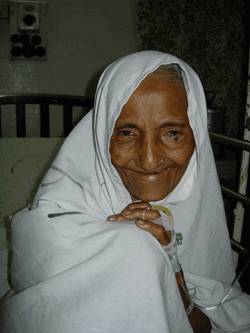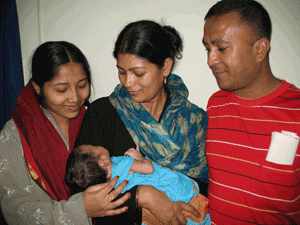Despite enormous health care challenges in Bangladesh, alumna Heather Fowler is in it for the long haul.
Before Heather Fowler, D.O.’94, ever met Viggo Olsen, M.D., he shaped her career and led her to the most densely populated country in the world.
As a teenager, Fowler read Olsen’s book Daktar: Diplomat in Bangladesh, which chronicled his medical missionary work and efforts to establish the country’s first modern medical facility.
“The book influenced me,” she says. “During my interview at DMU, I told the staff I planned to do medical mission work.”
During her year in private practice, Fowler obtained charitable contributions and joined the Association of Baptists, a nongovernmental organization that helped her locate in Bangladesh in 1999. She now is director of the reproductive and child health care program at Malumghat Hospital, the center she read about in Olsen’s book.

“That’s just how God directed,” she says.
It’s no work for wimps. More than 156 million people live in the South Asian country, which is slightly smaller than the state of Iowa. Nearly half live below the poverty line. Malnutrition is rampant; diarrhea, pneumonia, malaria and rabies are common.
“The people don’t have a lot of exposure to basic health care such as immunizations and clean water,” Fowler notes. “They’re so poor, they can’t afford to even boil their water, so trying to stay healthy is nearly impossible.”
Fowler and her colleagues, who include four American physicians and eight American nurses, also often deal with leaky catheters and IV bottles. They resterilize their gloves and frequently can’t get the inhalers and rabies vaccinations their patients need.
“We have a fairly good lab and X-ray department, but with the humid jungle atmosphere, it’s always a struggle to keep things working,” she says. “Electricity is very poor, so we have to run our generator on diesel fuel, which is very expensive.”
Fowler splits her time between the 60-bed hospital and its outpatient clinic, which sees 125 to 200 people per day. She also provides training to Bangladeshis. Once a month she offers obstetric services in another clinic; three or four times a year she provides care in the country’s remote hilltrack areas.

Fowler and her colleagues also deal with cultural issues that complicate their patients’ lives. One woman failed to come to the hospital for timely treatment of gangrene because her son was out of the country, and women typically don’t travel without a male family member; by the time she arrived, her foot had fallen off. Another woman’s family couldn’t pay her dowry, so her husband’s family chopped off both her legs. “You see how defenseless and hopeless and helpless women can be in a very male-dominated society,” Fowler says. “They need a voice and someone who cares about them and can show them compassion.”
Fowler’s unwavering focus on meeting needs sustains her. After the terrorist attacks in America on Sept. 11, 2001, many in the predominantly Muslim country demonstrated against the U.S. But when a busload of angry citizens who planned to march against the hospital slid off the rain-soaked road, they instead came to the hospital as patients.
“At the time, I was the only doctor there, so I was really busy and didn’t have much time to think about it,” she says. “Plus I had just gotten to Bangladesh in 1999 and was not ready to leave my life’s dream.
“Even though it’s difficult, part of the attraction is that the physical, emotional and spiritual needs of the people are so great,” she adds. “That offers great opportunities – I love the diversity and challenge of what I see.”
There are successes, too, like the 2.2-pound infant Fowler delivered just 31 weeks into the mother’s pregnancy; seven years later, that girl still visits the clinic.
“It’s such a large population, but you help individuals. You have to remember that,” she says. “I’ll admit it’s overwhelming at times. But it goes along with the D.O. philosophy, the commitment to the whole person, physically, emotionally and spiritually. It goes beyond just passing out a pill.”


